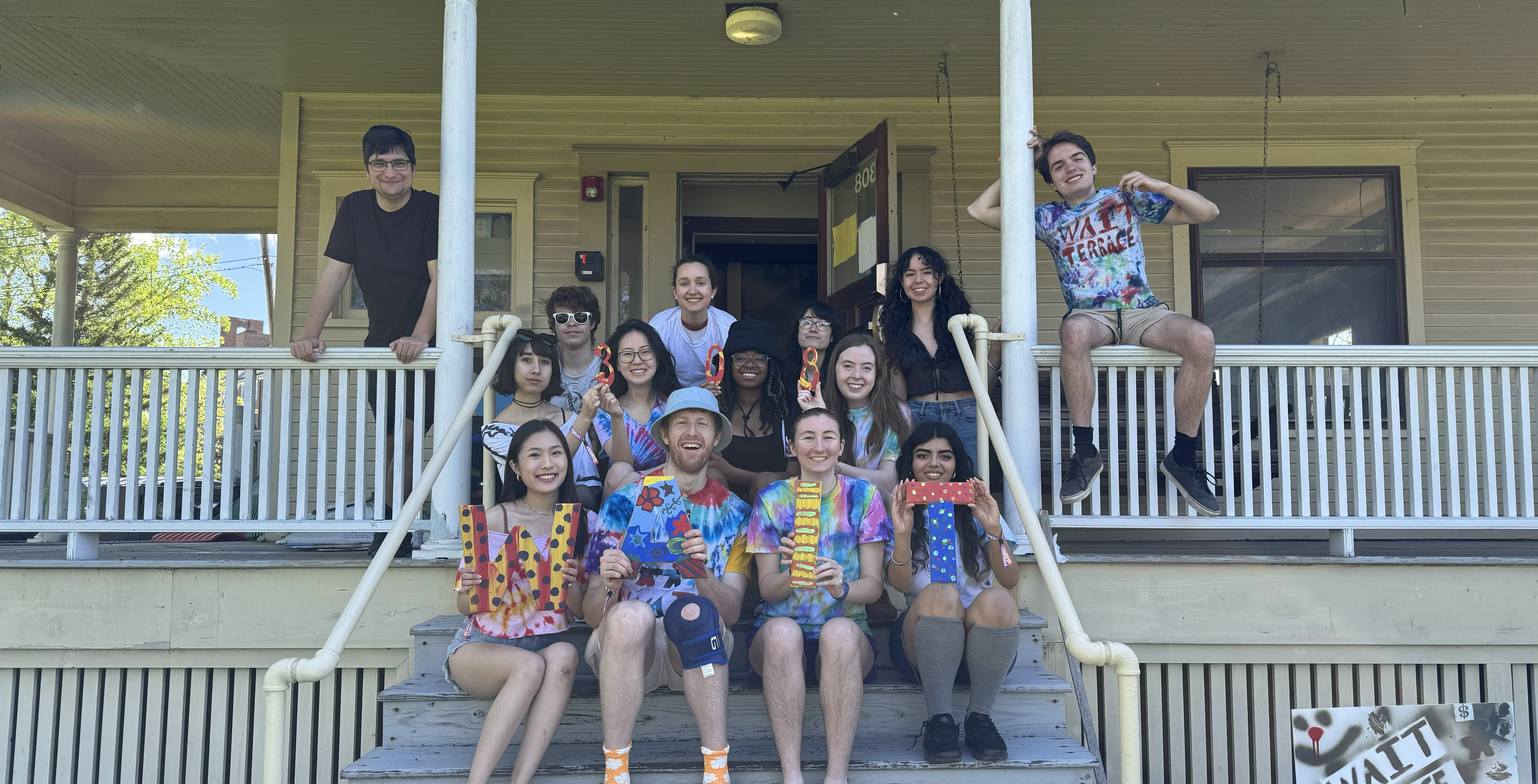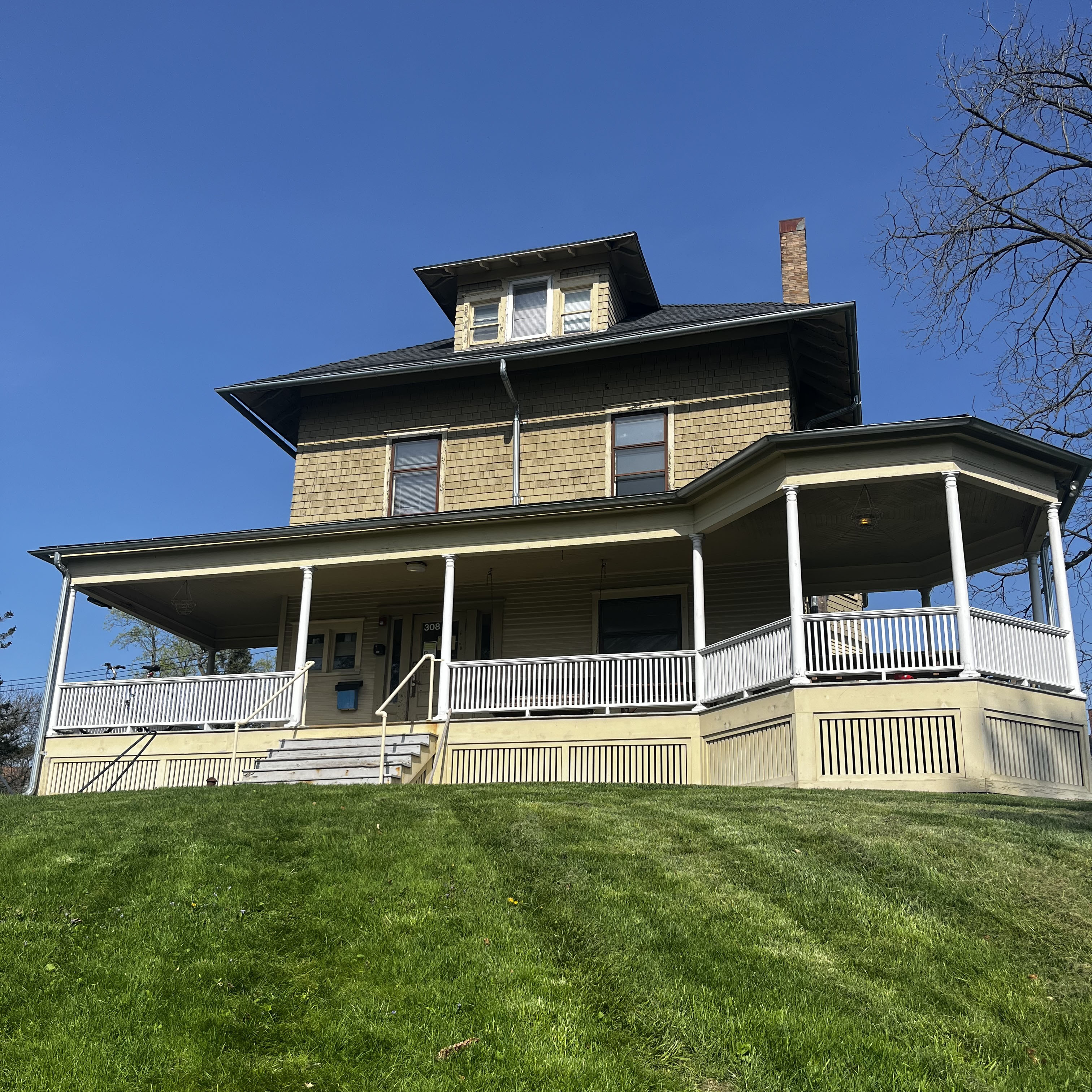Wait Terrace Co-Op Provides Space for Cornellians to Cultivate Community

By Kelly Kuehn, Student and Campus Life
Marc Scocca ’25 remembers the first time he saw the Wait Terrace co-op. The Hotel Administration major was walking from Risley Hall to Morrison Dining Hall during his first year on campus when a house with a stunning porch caught his attention. He immediately imagined watching the sun set with a group of people from that spot and realized it was something special.
“The porch looks nice, but I also saw it as something that could promote community almost spontaneously, which appealed to me,” Scocca said.
Scocca learned that the big house was Wait Terrace, a cooperative residence (commonly called a “co-op”) on campus. It seemed like fate; Scocca’s friends already told him about cooperative living at Cornell, and he planned to Mosey (an open house-like event for Cornell’s co-ops) during his second year but wasn’t sure which houses to visit. Once he learned that the house with the porch was Wait Terrace, it became the top place on his list. He Moseyed Wait Terrace during the Fall ’22 semester and immediately felt a connection to its residents, cementing his decision to apply for residency.
Marina Starikovsky ’25 had a similar experience when she Moseyed Wait Terrace the spring semester of her first year. She heard about the co-ops through a Cornell Outdoor Odyssey instructor as she started Cornell and was interested in the co-ops’ tight-knit communities. She Moseyed many of the houses but liked Wait Terrace the most because it felt like everyone in the house had genuine connections with one another.
“During Mosey, I remember one resident coming downstairs to show everyone her outfit and asking for her housemates' opinions,” Starikovsky said. “That small detail really struck me as emblematic of the safe and close-knit nature of Wait Terrace.”

Cultivating community and making connections
Scocca and Starikovsky are two of the 13 residents of Wait Terrace, one of the smaller co-ops at Cornell. Both were drawn to the co-op’s size, as they felt they could form strong bonds with their housemates.
“Every person truly makes an impact,” Scocca said. “Everyone’s part of the community and brings something to the table.”
Scocca and Starikovsky agree that Wait Terrace’s community, described as friendly, welcoming, and collaborative, is their favorite thing about the co-op. It’s common to find residents hanging out in the living room talking about their days.
“That openness helps us become closer because we're sharing a lot about ourselves,” Scocca said. “We get to invest in each other's day-to-day lives that way.”
That shared connection among Wait Terrace’s community reaches beyond its walls. Starikovsky says she attends different performances and club events in support of her housemates, broadening her view of Cornell and exposing her to experiences she may not have had otherwise. Living in the co-op has also expanded her circle.
“A lot of engineers live in my co-op, and my roommate last year was a design environmental analysis major,” Starikovsky, who is an Industrial and Labor Relations major, said. “I don’t think I would have met them had we not lived in Wait Terrace together.”
Building skills and gaining experience
Scocca and Starikovsky are house managers in Wait Terrace and say they’ve developed key skills they’ll use after Cornell. Scocca is interested in pursuing hotel ownership and management and is grateful for the opportunity to get hands-on management experience and grow as a leader.
“It’s rewarding to collaborate with people from different backgrounds and understand where they're coming,” Scocca said. “It’s also helped me understand what it takes to develop a community culture and support that culture each day.”
Starikovsky is also thankful for all she’s learned through managing finances, coordinating house duties, and collaborating with her community. It’s helped her grow as a leader and taught her how to advocate for herself and her housemates.
Encouraging co-op living
Both Scocca and Starikovsky encourage Cornellians to explore cooperative living on campus because of the positive experiences they’ve had at Wait Terrace. Scocca lived in a large residence hall previously and while he found a community in that space, he also saw dozens of people he didn’t know. He enjoys knowing each member of Wait Terrace.
“It feels like a home to me and the people in it feel like family,” Scocca said.
Scocca says students should check out Mosey, an open house the co-ops host during the fall and spring semesters, to learn more about each co-op community.
“Mosey is a fun process,” Scocca said. “You get to visit each house, interact with the communities, and get a sense of each house’s vibe.”
Starikovsky agrees, adding that people who are looking for a residential space to build closer relationships with fellow Cornellians can benefit from cooperative housing.
“It’s a good place to be if you like to come home to a community of supportive peers,” Starikovsky said.
For those on the fence about exploring the co-ops, Scocca’s encourages them to keep their minds open to the possibilities.
“I don't know what my Cornell experience would be if it wasn't for the community I've been privileged to interact with throughout my time at Wait Terrace,” Scocca said.
What waits for you at Wait Terrace or one of Cornell’s other cooperative living spaces? Learn more about co-op living by emailing co-op
